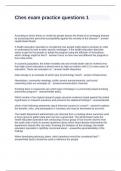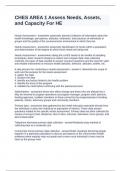Ches 1 - Study guides, Class notes & Summaries
Looking for the best study guides, study notes and summaries about Ches 1? On this page you'll find 373 study documents about Ches 1.
Page 2 out of 373 results
Sort by
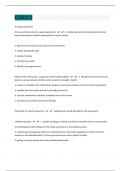
-
CHES 1|116 Questions with 100% Correct Answers | Updated & Verified
- Exam (elaborations) • 19 pages • 2024
- Available in package deal
-
- $7.99
- + learn more
(To successfully conduct a needs assessment) - ️️1. Gather data and information to determine what interventions would be appropriate in a given setting. 2. Determine the purpose and scope of the assessment 3. Collect appropriate data 4. Analyze the data 5. Prioritize the needs 6. Identify the program focus Measure the community 's capacity to solve health problem - ️️1. identify community resources (persons, groups, places), abilities, skills, networks, strengths, talents 2. ...
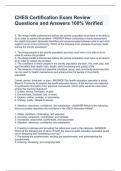
-
CHES Certification Exam Review Questions and Answers 100% Verified
- Exam (elaborations) • 17 pages • 2024
-
Available in package deal
-
- $11.99
- + learn more
CHES Certification Exam Review Questions and Answers 100% VerifiedCHES Certification Exam Review Questions and Answers 100% VerifiedCHES Certification Exam Review Questions and Answers 100% Verified 2. The things health professionals believe the priority population must have or be able to do in order to resolve the problem - ANSWER-When conducting a needs assessment, the Health Education Specialist identifies and measures gaps between what is and what ought to occur in the community. Which of t...
Ches exam practice questions 1
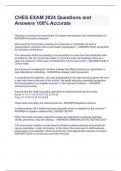
-
CHES EXAM 2024 Questions and Answers 100% Accurate
- Exam (elaborations) • 3 pages • 2024
-
Available in package deal
-
- $10.49
- + learn more
CHES EXAM 2024 Questions and Answers 100% Accurate CHES EXAM 2024 Questions and Answers 100% Accurate CHES EXAM 2024 Questions and Answers 100% Accurate CHES EXAM 2024 Questions and Answers 100% Accurate Ongoing monitoring and assessment of program development and implementation is : - ANSWER-Formative evaluation What would be the primary incentive for a business or corporation to have a representative volunteer with a local health organization? - ANSWER-Public recognition for volunteer con...
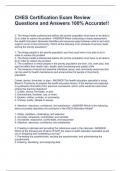
-
CHES Certification Exam Review Questions and Answers 100% Accurate!!
- Exam (elaborations) • 17 pages • 2024
-
- $12.99
- + learn more
2. The things health professionals believe the priority population must have or be able to do in order to resolve the problem - ANSWER-When conducting a needs assessment, the Health Education Specialist identifies and measures gaps between what is and what ought to occur in the community. Which of the following is an example of service needs among the priority population? 1. The things people in the priority population say they must have or be able to do in order to resolve the problem 2. Th...
CHES AREA 1 Assess Needs, Assets, and Capacity For HE
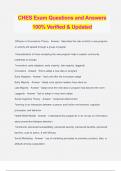
-
CHES Exam Questions and Answers 100% Verified & Updated
- Exam (elaborations) • 12 pages • 2024
- Available in package deal
-
- $12.49
- + learn more
CHES Exam Questions and Answers 100% Verified & Updated Diffusion of Innovations Theory - Answer- *describes the rate at which a new program or activity will spread through a group of people *characteristics of those accepting the new program help to explain community readiness to change *innovators, early adopters, early majority, late majority, laggards Innovators - Answer- *first to adopt a new idea or program Early Adopters - Answer- *wait until after the innovators adopt Early Majo...
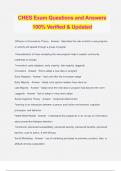
-
CHES Exam Questions and Answers 100% Verified & Updated
- Exam (elaborations) • 12 pages • 2024
- Available in package deal
-
- $12.49
- + learn more
CHES Exam Questions and Answers 100% Verified & Updated Diffusion of Innovations Theory - Answer- *describes the rate at which a new program or activity will spread through a group of people *characteristics of those accepting the new program help to explain community readiness to change *innovators, early adopters, early majority, late majority, laggards Innovators - Answer- *first to adopt a new idea or program Early Adopters - Answer- *wait until after the innovators adopt Early Majo...

-
CHES Exam Questions and Answers 100% Pass
- Exam (elaborations) • 40 pages • 2024
- Available in package deal
-
- $13.49
- + learn more
CHES Exam Questions and Answers 100% Pass Evaluation - Answer- assess a process or program to provide evidence and feedback for the program. Research - Answer- is an organized process using the scientific method for investigating problems. Can be conducted with the intent to generalize findings from a sample to a larger population. Does not always aim for, or achieve, evaluative conclusions, and it is restricted to empirical (rather than evaluative) data. Bases observed, measured, or calc...
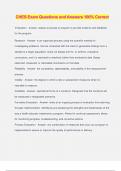
-
CHES Exam Questions and Answers 100% Correct
- Exam (elaborations) • 40 pages • 2024
- Available in package deal
-
- $13.49
- + learn more
CHES Exam Questions and Answers 100% Correct Evaluation - Answer- assess a process or program to provide evidence and feedback for the program. Research - Answer- is an organized process using the scientific method for investigating problems. Can be conducted with the intent to generalize findings from a sample to a larger population. Does not always aim for, or achieve, evaluative conclusions, and it is restricted to empirical (rather than evaluative) data. Bases observed, measured, or c...

Did you know that on average a seller on Stuvia earns $82 per month selling study resources? Hmm, hint, hint. Discover all about earning on Stuvia

